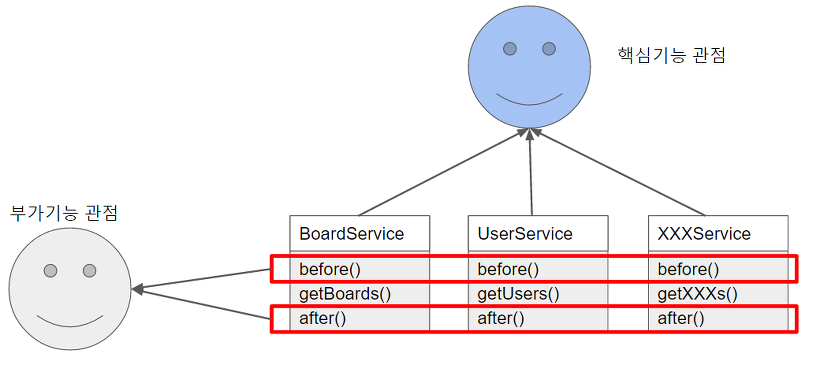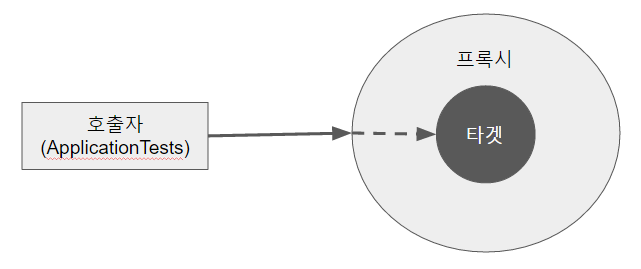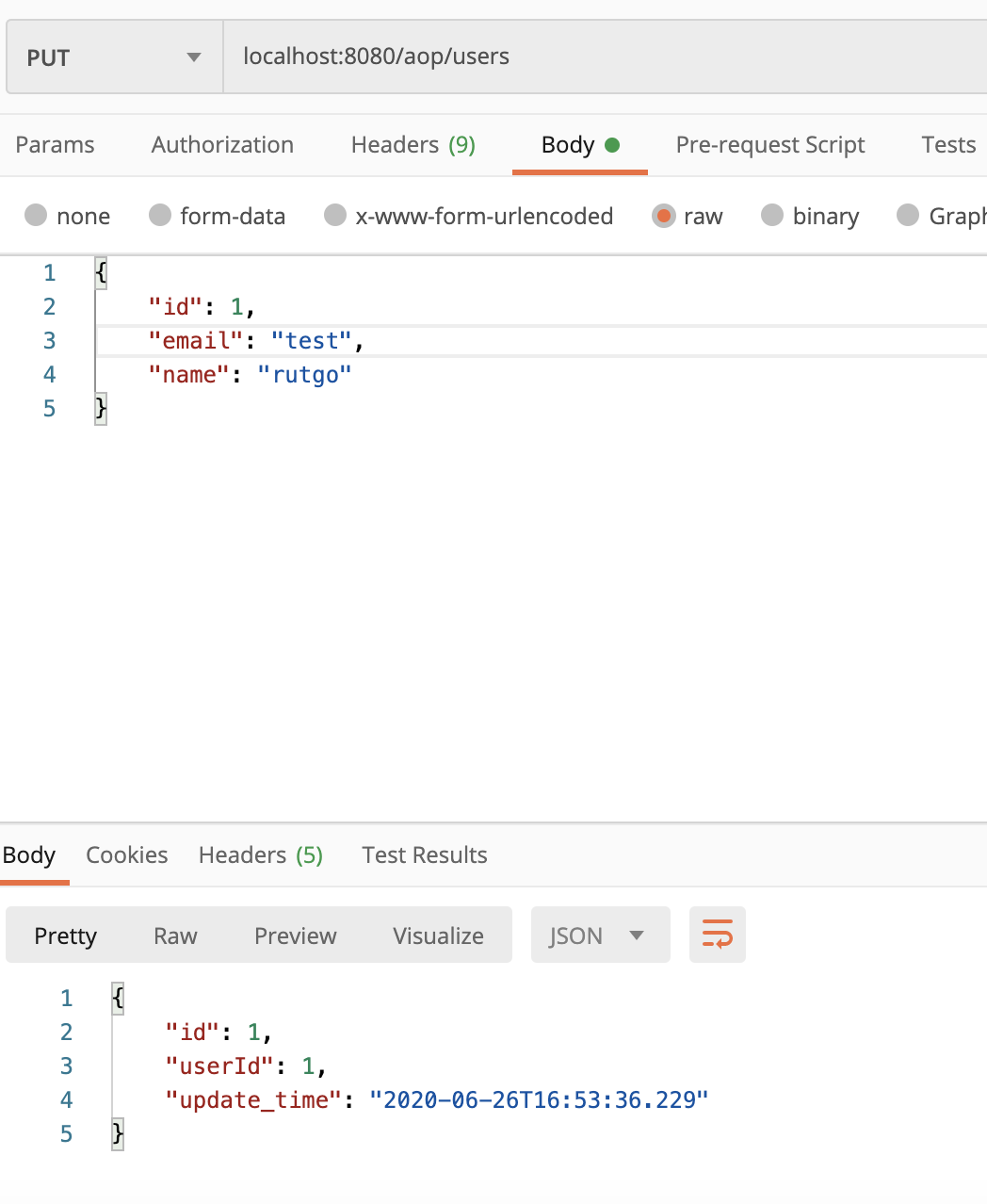Backend/Spring
AOP를 이해해보자.
Seyun(Marco)
2020. 6. 25. 23:02
728x90
이 글은 jojoldu님의 글인
[AOP 정리](https://jojoldu.tistory.com/69)글을 보고 정리한 글입니다.
문제 상황
게시판 서비스와 유저 서비스가 있다고 가정한다.
Spring boot + JPA + H2 + Gradle로 구현한다.
게시글 전체조회, 유저 전체조회 기능을 구현한다.
해당 기능들의 실행 시간이 얼마나 걸리는지 확인한다.
build.gradle
plugins {
id 'org.springframework.boot' version '2.3.0.RELEASE'
id 'io.spring.dependency-management' version '1.0.9.RELEASE'
id 'java'
}
group 'org.example'
version '1.0-SNAPSHOT'
sourceCompatibility = 1.8
repositories {
mavenCentral()
}
dependencies {
implementation 'org.springframework.boot:spring-boot-starter-web'
implementation'org.springframework.boot:spring-boot-starter-data-jpa'
runtime 'com.h2database:h2'
testImplementation 'org.springframework.boot:spring-boot-starter-test'
}- Board
package jojoldu.aop.ex.common;
import javax.persistence.Column;
import javax.persistence.Entity;
import javax.persistence.GeneratedValue;
import javax.persistence.GenerationType;
import javax.persistence.Id;
@Entity
public class Board {
@Id
@GeneratedValue(strategy = GenerationType.IDENTITY)
private Long id;
@Column
private String title;
@Column
private String content;
public Board() {
}
public Board(final String title, final String content) {
this.title = title;
this.content = content;
}
public Long getId() {
return id;
}
public String getTitle() {
return title;
}
public String getContent() {
return content;
}
}- BoardRepository
package jojoldu.aop.ex.common;
import org.springframework.data.jpa.repository.JpaRepository;
public interface BoardRepository extends JpaRepository<Board, Long> {
}- User
package jojoldu.aop.ex.common;
import javax.persistence.Column;
import javax.persistence.Entity;
import javax.persistence.GeneratedValue;
import javax.persistence.GenerationType;
import javax.persistence.Id;
@Entity
public class User {
@Id
@GeneratedValue(strategy = GenerationType.IDENTITY)
private Long id;
@Column
private String email;
@Column
private String name;
public User() {
}
public User(final String email, final String name) {
this.email = email;
this.name = name;
}
public Long getId() {
return id;
}
public String getEmail() {
return email;
}
public String getName() {
return name;
}
}- UserRepository
package jojoldu.aop.ex.common;
import org.springframework.data.jpa.repository.JpaRepository;
public interface UserRepository extends JpaRepository<User, Long> {
}기초적인 방법
- BoardService
package jojoldu.aop.ex.basic;
import java.util.List;
import org.springframework.stereotype.Service;
import jojoldu.aop.ex.common.Board;
import jojoldu.aop.ex.common.BoardRepository;
@Service
public class BoardService {
private final BoardRepository boardRepository;
public BoardService(final BoardRepository boardRepository) {
this.boardRepository = boardRepository;
}
public void save(Board board) {
boardRepository.save(board);
}
public List<Board> findAll() {
long startTime = System.currentTimeMillis();
List<Board> boards = boardRepository.findAll();
long endTime = System.currentTimeMillis();
System.out.printf("시작 시간 : %d, 끝나는 시간 %d, 총 걸리는 시간 : %d \n",
startTime, endTime, endTime - startTime);
return boards;
}
}- BoardController
package jojoldu.aop.ex.basic;
import java.util.List;
import javax.annotation.PostConstruct;
import org.springframework.web.bind.annotation.GetMapping;
import org.springframework.web.bind.annotation.RestController;
import jojoldu.aop.ex.common.Board;
@RestController
public class BoardController {
private final BoardService boardService;
public BoardController(final BoardService boardService) {
this.boardService = boardService;
}
@PostConstruct
public void setup() {
for (int i = 0; i < 100; i++) {
boardService.save(new Board(i + "번째 게시글의 제목", i + "번째 게시글의 내용"));
}
}
@GetMapping("/boards")
public List<Board> getBoards() {
return boardService.findAll();
}
}- UserService
package jojoldu.aop.ex.basic;
import java.util.List;
import org.springframework.stereotype.Service;
import jojoldu.aop.ex.common.User;
import jojoldu.aop.ex.common.UserRepository;
@Service
public class UserService {
private final UserRepository userRepository;
public UserService(final UserRepository userRepository) {
this.userRepository = userRepository;
}
public void save(User user) {
userRepository.save(user);
}
public List<User> findAll() {
long startTime = System.currentTimeMillis();
List<User> users = userRepository.findAll();
long endTime = System.currentTimeMillis();
System.out.printf("시작 시간 : %d, 끝나는 시간 %d, 총 걸리는 시간 : %d",
startTime, endTime, endTime - startTime);
return users;
}
}- UserController
package jojoldu.aop.ex.basic;
import java.util.List;
import javax.annotation.PostConstruct;
import org.springframework.web.bind.annotation.GetMapping;
import org.springframework.web.bind.annotation.RestController;
import jojoldu.aop.ex.common.User;
@RestController
public class UserController {
private final UserService userService;
public UserController(final UserService userService) {
this.userService = userService;
}
@PostConstruct
public void setup() {
for (int i = 0; i < 100; i++) {
userService.save(new User(i + "@email.com", i + "번째 사용자"));
}
}
@GetMapping("/users")
public List<User> getBoards() {
return userService.findAll();
}
}- 실행결과
시작 시간 : 1593071018484, 끝나는 시간 1593071018602, 총 걸리는 시간 : 118
시작 시간 : 1593071029778, 끝나는 시간 1593071029786, 총 걸리는 시간 : 8- 문제점
- 단일 책임 원칙 위반
- 메소드들은
조회라는 책임과 수행시간을 측정하고 출력하는 기능까지 여러개의 책임을 가지고 있다.
- 메소드들은
- 중복 코드
- 수행 시간 측정과 출력 기능이 중복이다.
- 단일 책임 원칙 위반
상속
- SuperPerformance
package jojoldu.aop.ex.inheritance;
import java.util.List;
public abstract class SuperPerformance<T> {
private long start() {
return System.currentTimeMillis();
}
private void end(long startTime) {
long endTime = System.currentTimeMillis();
System.out.printf("시작 시간 : %d, 끝나는 시간 %d, 총 걸리는 시간 : %d \n",
startTime, endTime, endTime - startTime);
}
public abstract List<T> findAll();
public List<T> getData() {
long startTime = start();
List<T> data = findAll();
end(startTime);
return data;
}
}- InheritBoardService
package jojoldu.aop.ex.inheritance;
import java.util.List;
import org.springframework.stereotype.Service;
import jojoldu.aop.ex.common.Board;
import jojoldu.aop.ex.common.BoardRepository;
@Service
public class InheritBoardService extends SuperPerformance<Board> {
private final BoardRepository boardRepository;
public InheritBoardService(final BoardRepository boardRepository) {
this.boardRepository = boardRepository;
}
public void save(Board board) {
boardRepository.save(board);
}
@Override
public List<Board> findAll() {
return boardRepository.findAll();
}
}- InheritBoardController
package jojoldu.aop.ex.inheritance;
import java.util.List;
import javax.annotation.PostConstruct;
import org.springframework.web.bind.annotation.GetMapping;
import org.springframework.web.bind.annotation.RestController;
import jojoldu.aop.ex.common.Board;
@RestController
public class InheritBoardController {
private final InheritBoardService inheritBoardService;
public InheritBoardController(final InheritBoardService inheritBoardService) {
this.inheritBoardService = inheritBoardService;
}
@PostConstruct
public void setup() {
for (int i = 0; i < 100; i++) {
inheritBoardService.save(new Board(i + "번째 게시글의 제목", i + "번째 게시글의 내용"));
}
}
@GetMapping("/inherit/boards")
public List<Board> getBoards() {
return inheritBoardService.getData();
}
}- InheritUserService
package jojoldu.aop.ex.inheritance;
import java.util.List;
import org.springframework.stereotype.Service;
import jojoldu.aop.ex.common.User;
import jojoldu.aop.ex.common.UserRepository;
@Service
public class InheritUserService extends SuperPerformance<User> {
private final UserRepository userRepository;
public InheritUserService(final UserRepository userRepository) {
this.userRepository = userRepository;
}
public void save(User user) {
userRepository.save(user);
}
public List<User> findAll() {
List<User> users = userRepository.findAll();
return users;
}
}- InheritUserController
package jojoldu.aop.ex.inheritance;
import java.util.List;
import javax.annotation.PostConstruct;
import org.springframework.web.bind.annotation.GetMapping;
import org.springframework.web.bind.annotation.RestController;
import jojoldu.aop.ex.common.User;
@RestController
public class InheritUserController {
private final InheritUserService inheritUserService;
public InheritUserController(final InheritUserService inheritUserService) {
this.inheritUserService = inheritUserService;
}
@PostConstruct
public void setup() {
for (int i = 0; i < 100; i++) {
inheritUserService.save(new User(i + "@email.com", i + "번째 사용자"));
}
}
@GetMapping("/inherit/users")
public List<User> getBoards() {
return inheritUserService.getData();
}
}- 실행 결과
시작 시간 : 1593072316052, 끝나는 시간 1593072316140, 총 걸리는 시간 : 88
시작 시간 : 1593072322050, 끝나는 시간 1593072322060, 총 걸리는 시간 : 10- 해결사항
- 중복 코드와 단일 책임 원칙은 지켰습니다.
- 문제점
- 상속은 부모 클래스에 너무 종속적이기 때문에 특별한 일이 있는 경우 피하는것이 좋습니다.
DI(Dependency Injection)
- DiSuperService
package jojoldu.aop.ex.Denpency;
import java.util.List;
public interface DiSuperService<T> {
List<T> getData();
T save(T t);
}- DiBoardPerformance
package jojoldu.aop.ex.Denpency;
import java.util.List;
import org.springframework.beans.factory.annotation.Qualifier;
import org.springframework.context.annotation.Primary;
import org.springframework.stereotype.Service;
import jojoldu.aop.ex.common.Board;
@Primary
@Service
public class DiBoardPerformance implements DiSuperService<Board> {
@Qualifier("DiBoardServiceImpl")
private final DiSuperService<Board> diBoardService;
public DiBoardPerformance(final DiBoardServiceImpl diBoardService) {
this.diBoardService = diBoardService;
}
@Override
public List<Board> getData() {
long startTime = start();
List<Board> boards = diBoardService.getData();
end(startTime);
return boards;
}
@Override
public Board save(final Board board) {
return diBoardService.save(board);
}
private long start() {
return System.currentTimeMillis();
}
private void end(long startTime) {
long endTime = System.currentTimeMillis();
System.out.printf("시작 시간 : %d, 끝나는 시간 %d, 총 걸리는 시간 : %d \n",
startTime, endTime, endTime - startTime);
}
}- DiBoardServiceImpl
package jojoldu.aop.ex.Denpency;
import java.util.List;
import org.springframework.stereotype.Service;
import jojoldu.aop.ex.common.Board;
import jojoldu.aop.ex.common.BoardRepository;
@Service
public class DiBoardServiceImpl implements DiSuperService<Board> {
private final BoardRepository boardRepository;
public DiBoardServiceImpl(final BoardRepository boardRepository) {
this.boardRepository = boardRepository;
}
@Override
public List<Board> getData() {
return boardRepository.findAll();
}
@Override
public Board save(final Board board) {
return boardRepository.save(board);
}
}- DiBoardController
package jojoldu.aop.ex.Denpency;
import java.util.List;
import javax.annotation.PostConstruct;
import org.springframework.web.bind.annotation.GetMapping;
import org.springframework.web.bind.annotation.RestController;
import jojoldu.aop.ex.common.Board;
@RestController
public class DiBoardController {
private final DiSuperService<Board> diBoardService;
public DiBoardController(final DiSuperService<Board> diBoardService) {
this.diBoardService = diBoardService;
}
@PostConstruct
public void setup() {
for (int i = 0; i < 100; i++) {
diBoardService.save(new Board(i + "번째 게시글의 제목", i + "번째 게시글의 내용"));
}
}
@GetMapping("/di/boards")
public List<Board> getBoards() {
return diBoardService.getData();
}
}- DiUserPerformance
package jojoldu.aop.ex.Denpency;
import java.util.List;
import org.springframework.beans.factory.annotation.Qualifier;
import org.springframework.context.annotation.Primary;
import org.springframework.stereotype.Service;
import jojoldu.aop.ex.common.User;
@Primary
@Service
public class DiUserPerformance implements DiSuperService<User> {
@Qualifier("DiUserServiceImpl")
private final DiSuperService<User> diUserService;
public DiUserPerformance(final DiSuperService<User> diUserService) {
this.diUserService = diUserService;
}
@Override
public List<User> getData() {
long startTime = start();
List<User> boards = diUserService.getData();
end(startTime);
return boards;
}
@Override
public User save(final User user) {
return diUserService.save(user);
}
private long start() {
return System.currentTimeMillis();
}
private void end(long startTime) {
long endTime = System.currentTimeMillis();
System.out.printf("시작 시간 : %d, 끝나는 시간 %d, 총 걸리는 시간 : %d \n",
startTime, endTime, endTime - startTime);
}
}- DiUserServiceImpl
package jojoldu.aop.ex.Denpency;
import java.util.List;
import org.springframework.stereotype.Service;
import jojoldu.aop.ex.common.User;
import jojoldu.aop.ex.common.UserRepository;
@Service
public class DiUserServiceImpl implements DiSuperService<User> {
private final UserRepository userRepository;
public DiUserServiceImpl(final UserRepository userRepository) {
this.userRepository = userRepository;
}
@Override
public List<User> getData() {
return userRepository.findAll();
}
@Override
public User save(final User user) {
return userRepository.save(user);
}
}- DiUserController
package jojoldu.aop.ex.Denpency;
import java.util.List;
import javax.annotation.PostConstruct;
import org.springframework.web.bind.annotation.GetMapping;
import org.springframework.web.bind.annotation.RestController;
import jojoldu.aop.ex.common.User;
@RestController
public class DiUserController {
private final DiSuperService<User> diUserService;
public DiUserController(final DiSuperService<User> diUserService) {
this.diUserService = diUserService;
}
@PostConstruct
public void setup() {
for (int i = 0; i < 100; i++) {
diUserService.save(new User(i + "@email.com", i + "번째 사용자"));
}
}
@GetMapping("/di/users")
public List<User> getBoards() {
return diUserService.getData();
}
}- 실행결과
시작 시간 : 1593074101934, 끝나는 시간 1593074102035, 총 걸리는 시간 : 101
시작 시간 : 1593074105001, 끝나는 시간 1593074105014, 총 걸리는 시간 : 13- 문제점
- 코드가 깔끔하지 않고 많은 관계가 필요하다.
- 비지니스 로직과 부가 기능들의 관계가 복잡하다.
- 비지니스 로직을 구현할때 부가 기능 로직도 같이 생각해야 한다.
AOP(Aspect-Oriented Programming)
AOP란?
- 애플리케이션 전체에 걸쳐 사용되는 기능(부가 기능)을 재사용하도록 지원한다.
- 관점 지향 프로그래밍으로 프로젝트 구조를 바라 보는 관점을 바꿔보자는 이야기로, 보통 제 3자의 관점에서 바라보자 라는 이야기를 합니다.

- 위와 같이 핵심 기능 관점에서 봤을때 각자 코드를 구현하고 있는 것 처럼 보입니다.

그러나 부가 기능 관점에서 봤을때, 수행 시간 측정을 나타내는 메소드가 공통되는 것을 알 수 있습니다.
기존에 OPP에서 바라보던 관점을 다르게 하여 부가기능적인 측면에서 보았을 때 공통된 요소를 추출하자는 것으로 가로 영역의 공통 부분을 잘라냈다고 하여, 크로스 컷팅(Cross-Cutting) 이라고 불립니다.
지금까지 살펴본 상속과 의존성 주입으로도 공통된 기능을 재사용할 수 있지만, 깔끔한 모듈화가 어렵다.
장점
- 애플리케이션 전체에 흩어진 공통 기능이 하나의 장소에서 관리
- 다른 서비스 모듈들이 본인의 목적에만 충실하고 그외 사항들은 신경쓸 필요 없다.(비지니스 로직에 집중할 수 있다.)
OOP와 AOP
- OOP(Obejct-Oriented-Programming)
- 모듈화의 핵심 단위는 비즈니스 로직
- AOP(Aspected-Oriented-Programming)
- 각 모듈의 주 목적 외에 필요한 부가적 기능
AOP 용어
- Target
- 부가 기능을 부여하는 대상
- Aspect
- 부가 기능 모듈
- advice + pointCut
- Advice
- 부가기능을 담은 구현체
- 종속적이기 않기 때문에 부가기능에만 집중이 가능
- PointCut
- 부가기능이 적용될 대상을 선정하는 기법
- JoinPoint
- adivce가 적용될 수 있는 위치
- Spring에서는 메소드 조인포인트만 제공하고 있다.
- Proxy
- Target을 감싸서 Target의 요청을 대신 받아주는 Wrapping Object
- 클라이언트에서 Target을 호출하면 Target이 아닌 Proxy가 호출되어, 타켓 메소드 실행전에 선처리, 타켓 메소드 실행 후, 후처리를 실행하도록 구성되어 있습니다.

- Introduction
- 타켓 클래스에 코드 변경없이 신규 메소드나 멤버변수를 추가하는 기능
- Weaving
- 지정된 객체에 Aspect를 적용해서 새로운 Proxy Obejc를 만드는 과정이다.
- 런타임, 컴파일, 클래스 로더 시점이 있는데 , Spring AOP는 런타임에서 프록시 객체가 생성됩니다.
어노테이션 기반 AOP
- PerfLogger
package jojoldu.aop.ex.aop;
import java.lang.annotation.Documented;
import java.lang.annotation.ElementType;
import java.lang.annotation.Target;
@Documented
@Target(ElementType.METHOD)
public @interface PerfLogger {
}- Performance
package jojoldu.aop.ex.aop;
import org.aspectj.lang.ProceedingJoinPoint;
import org.aspectj.lang.annotation.Around;
import org.aspectj.lang.annotation.Aspect;
@Aspect
public class Performance {
@Around("@annotation(jojoldu.aop.ex.aop.PerfLogger)")
public Object calculatePerformanceTime(ProceedingJoinPoint proceedingJoinPoint) {
Object result = null;
try {
long startTime = System.currentTimeMillis();
result = proceedingJoinPoint.proceed();
long endTime = System.currentTimeMillis();
System.out.printf("시작 시간 : %d, 끝나는 시간 %d, 총 걸리는 시간 : %d \n",
startTime, endTime, endTime - startTime);
} catch (Throwable throwable) {
System.out.println(throwable.getMessage());
}
return result;
}
}- AopBoardService
package jojoldu.aop.ex.aop;
import java.util.List;
import org.springframework.stereotype.Service;
import jojoldu.aop.ex.common.Board;
import jojoldu.aop.ex.common.BoardRepository;
@Service
public class AopBoardService {
private final BoardRepository boardRepository;
public AopBoardService(final BoardRepository boardRepository) {
this.boardRepository = boardRepository;
}
public void save(Board board) {
boardRepository.save(board);
}
@PerfLogger
public List<Board> findAll() {
List<Board> boards = boardRepository.findAll();
return boards;
}
}- AopBoardController
package jojoldu.aop.ex.aop;
import java.util.List;
import javax.annotation.PostConstruct;
import org.springframework.web.bind.annotation.GetMapping;
import org.springframework.web.bind.annotation.RestController;
import jojoldu.aop.ex.common.Board;
@RestController
public class AopBoardController {
private final AopBoardService aopBoardService;
public AopBoardController(final AopBoardService aopBoardService) {
this.aopBoardService = aopBoardService;
}
@PostConstruct
public void setup() {
for (int i = 0; i < 100; i++) {
aopBoardService.save(new Board(i + "번째 게시글의 제목", i + "번째 게시글의 내용"));
}
}
@GetMapping("/aop/boards")
public List<Board> getBoards() {
return aopBoardService.findAll();
}
}- AopUserService
package jojoldu.aop.ex.aop;
import java.util.List;
import org.springframework.stereotype.Service;
import jojoldu.aop.ex.common.User;
import jojoldu.aop.ex.common.UserRepository;
@Service
public class AopUserService {
private final UserRepository userRepository;
public AopUserService(final UserRepository userRepository) {
this.userRepository = userRepository;
}
public void save(User user) {
userRepository.save(user);
}
@PerfLogger
public List<User> findAll() {
return userRepository.findAll();
}
}- AopUserController
package jojoldu.aop.ex.aop;
import java.util.List;
import javax.annotation.PostConstruct;
import org.springframework.web.bind.annotation.GetMapping;
import org.springframework.web.bind.annotation.RestController;
import jojoldu.aop.ex.common.User;
@RestController
public class AopUserController {
private final AopUserService aopUserService;
public AopUserController(final AopUserService aopUserService) {
this.aopUserService = aopUserService;
}
@PostConstruct
public void setup() {
for (int i = 0; i < 100; i++) {
aopUserService.save(new User(i + "@email.com", i + "번째 사용자"));
}
}
@GetMapping("/aop/users")
public List<User> getBoards() {
return aopUserService.findAll();
}
}- 실행 결과
시작 시간 : 1593076030403, 끝나는 시간 1593076030495, 총 걸리는 시간 : 92
시작 시간 : 1593076037710, 끝나는 시간 1593076037721, 총 걸리는 시간 : 11코드 설명
Around(): advice로 Aspect가 무엇을 언제 할지를 의미한다. 여기서 무엇은calcualtePerformanceTime()입니다.annotation(): 포인트컷 표현식 중 하나로, 어노테이션을 의미합니다.ProceedingJoinPoint:Around Advice에서 사용할 공통 기능 메서드는 대부분 파라미터로 전달 받은 이 클래스의proceed()메서드만 호출하면 된다.proceed(): Target메소드를 지칭하는 것으로,@Around를 사용했다는 반드시 이 메소드가 호출되어야 합니다.
Adivce
- Aspect가 무엇을, 언제 할지를 의미한다.
- 무엇은 메소드(위 코드에서는
calculatePerformanceTime())이 될것이고, 언제는@Around로 메소드 실행 전후가 될 것이다.
Aspect가 적용되는 시점
- 언제라는 시점을 나타내는 것은 총 5가지 타입이 존재한다.
- @Before(이전)
- 타켓 메서드가 호출되기 전
- @After
- 타켓 메서드가 완료된 후
- 이때, 결과와 관계가 없다.(성공, 예외 관계 없이)
- @AfterReturning (정상적 반환 이후)
- 타켓 메소드가 성공적으로 결과값을 반환한 경우
- @AfterThrowing
- 타켓 메소드가 예외를 던지는 경우
- @Around
- Adivce가 타켓 메소드를 감싸서 타켓 메소드 호출 전과 후 Advice 기능 수행
- 이때, proceed() 메서드가 꼭 있어야 한다.(target을 나타냄)
- @Before(이전)
포인트 컷 표현식
- 포인트 컷 표현식은 2가지로 나눠지는데, 지정자와 타켓 명세로 이루어져 있다.
- 지정자(타켓 명세)
- "@annotation(jojoldu.aop.ex.aop.PerfLogger)"
- 가장 많이 사용하는 지정자는
execution과@annotation이다.
포인트컷 지정자
- args()
- 메소드 인자가 타켓 명세에 포함되어 있는 경우
- @args()
- 메소드 인자가 타켓 명세에 포함된 어노테이션 타입을 갖는 경우
- execution()
- 접근제한자, 리턴타입, 인자타입, 클래스 / 인터페이스, 메소드명, 파라미터타입, 예외타입 등 전부 조합해 지정하는 것
- within()
- 접근제한자, 리턴타입, 인자타입, 클래스 / 인터페이스을 조합해 지정하는 것
- @within
- 주어진 어노테이션을 사용하는 타입으로 선언된 메소드
- this()
- 타켓 메소드가 지정된 빈 타입의 인스턴스인 경우
- target
- 타켓 메소드를 실행하는 객체의 클래스가 타켓 명세에 지정된 타입의 어노테이션이 있는 경우
- @target
- 타켓 메소드를 실행하는 객체의 클래스가 타켓 명세에 지정된 타입의 어노테이션이 있는 경우
- @annotation
- 타켓 메소드에 특정 어노테이션이 지정된 메소드
사용법 확장
- 어노테이션을 하나 더 추가하겠습니다.
package jojoldu.aop.ex.aop;
import java.lang.annotation.Documented;
import java.lang.annotation.ElementType;
import java.lang.annotation.Target;
@Documented
@Target(ElementType.METHOD)
public @interface PerfTimer {
}- 포인트컷 표현식에는 관계 연산자(AND, OR, NOT)를 사용할 수 있습니다.
@Around("@annotation(jojoldu.aop.ex.aop.PerfLogger) || @annotation(jojoldu.aop.ex.aop.PerfTimer)")@PerfLogger를@PerfTimer로 변경해보겠습니다.
package jojoldu.aop.ex.aop;
import java.util.List;
import org.springframework.stereotype.Service;
import jojoldu.aop.ex.common.Board;
import jojoldu.aop.ex.common.BoardRepository;
@Service
public class AopBoardService {
private final BoardRepository boardRepository;
public AopBoardService(final BoardRepository boardRepository) {
this.boardRepository = boardRepository;
}
public void save(Board board) {
boardRepository.save(board);
}
@PerfTimer
public List<Board> findAll() {
List<Board> boards = boardRepository.findAll();
return boards;
}
}- 표현식이 추가 된다면 가독성 문제가 발생됩니다.
- 따라서 변수처럼 표현식을 담아서 재사용을 할 수 있게 할 수 있습니다.
package jojoldu.aop.ex.aop;
import org.aspectj.lang.ProceedingJoinPoint;
import org.aspectj.lang.annotation.Around;
import org.aspectj.lang.annotation.Aspect;
import org.aspectj.lang.annotation.Pointcut;
@Aspect
public class Performance {
@Pointcut("@annotation(jojoldu.aop.ex.aop.PerfLogger)")
public void perfLogger() {
}
@Pointcut("@annotation(jojoldu.aop.ex.aop.PerfTimer)")
public void perfTimer() {
}
@Around("perfLogger() || perfTimer()")
public Object calculatePerformanceTime(ProceedingJoinPoint proceedingJoinPoint) {
Object result = null;
try {
long startTime = System.currentTimeMillis();
result = proceedingJoinPoint.proceed();
long endTime = System.currentTimeMillis();
System.out.printf("시작 시간 : %d, 끝나는 시간 %d, 총 걸리는 시간 : %d \n",
startTime, endTime, endTime - startTime);
} catch (Throwable throwable) {
System.out.println(throwable.getMessage());
}
return result;
}
}- 위 코드와 같이
@PointCut을 이용하면 변수와 같이 재사용한 포인트컷을 정의할 수 있습니다.
파라미터가 있는 Aspect
user가 update 될 때마다, History Table에 수정 내역을 저장해 관리하는 수정 내역 관리를 만들어 보자.
History
package jojoldu.aop.ex.common;
import java.time.LocalDateTime;
import javax.persistence.Column;
import javax.persistence.Entity;
import javax.persistence.EntityListeners;
import javax.persistence.GeneratedValue;
import javax.persistence.GenerationType;
import javax.persistence.Id;
import org.springframework.data.annotation.CreatedDate;
import org.springframework.data.jpa.domain.support.AuditingEntityListener;
@EntityListeners(value = {AuditingEntityListener.class})
@Entity
public class History {
@Id
@GeneratedValue(strategy = GenerationType.IDENTITY)
private Long id;
@Column
private Long userId;
@CreatedDate
private LocalDateTime update_time;
public History() {
}
public History(final Long userId) {
this.userId = userId;
}
public Long getId() {
return id;
}
public Long getUserId() {
return userId;
}
public LocalDateTime getUpdate_time() {
return update_time;
}
}- HistoryRepository
package jojoldu.aop.ex.common;
import org.springframework.data.jpa.repository.JpaRepository;
public interface HistoryRepository extends JpaRepository<History, Long> {
History findByUserId(Long id);
}- UserHistory
package jojoldu.aop.ex.aop;
import org.aspectj.lang.annotation.AfterReturning;
import org.aspectj.lang.annotation.Aspect;
import org.aspectj.lang.annotation.Pointcut;
import org.springframework.stereotype.Component;
import jojoldu.aop.ex.common.History;
import jojoldu.aop.ex.common.HistoryRepository;
import jojoldu.aop.ex.common.User;
@Aspect
@Component
public class UserHistory {
private final HistoryRepository historyRepository;
public UserHistory(final HistoryRepository historyRepository) {
this.historyRepository = historyRepository;
}
@Pointcut("execution(* jojoldu.aop.ex.aop.AopUserService.updateUser(*)) && args(user))")
public void updateUser(final User user){
}
@AfterReturning(value = "updateUser(user)", argNames = "user")
public void saveUser(final User user){
historyRepository.save(new History(user.getId()));
}
}여기서 중요한 것은
args(user)입니다. 이걸 이용해서 파라미터를 받아올 수 있습니다.@AfterReturning는 위에서 설명한 것과 같이 메소드 실행이 끝난 후 Aspect를 실행하도록 시점을 설정하는 것입니다.AopUserService
package jojoldu.aop.ex.aop;
import java.util.List;
import org.springframework.stereotype.Service;
import jojoldu.aop.ex.common.History;
import jojoldu.aop.ex.common.HistoryRepository;
import jojoldu.aop.ex.common.User;
import jojoldu.aop.ex.common.UserRepository;
@Service
public class AopUserService {
private final UserRepository userRepository;
private final HistoryRepository historyRepository;
public AopUserService(final UserRepository userRepository, final HistoryRepository historyRepository) {
this.userRepository = userRepository;
this.historyRepository = historyRepository;
}
public void save(User user) {
userRepository.save(user);
}
@PerfLogger
public List<User> findAll() {
return userRepository.findAll();
}
public void updateUser(User user) {
userRepository.save(user);
}
public History findHistoryBy(Long userId){
return historyRepository.findByUserId(userId);
}
}- AopUserController
package jojoldu.aop.ex.aop;
import java.util.List;
import javax.annotation.PostConstruct;
import org.springframework.web.bind.annotation.GetMapping;
import org.springframework.web.bind.annotation.PutMapping;
import org.springframework.web.bind.annotation.RequestBody;
import org.springframework.web.bind.annotation.RequestParam;
import org.springframework.web.bind.annotation.ResponseBody;
import org.springframework.web.bind.annotation.RestController;
import jojoldu.aop.ex.common.History;
import jojoldu.aop.ex.common.User;
@RestController
public class AopUserController {
private final AopUserService aopUserService;
public AopUserController(final AopUserService aopUserService) {
this.aopUserService = aopUserService;
}
@PostConstruct
public void setup() {
for (int i = 0; i < 100; i++) {
aopUserService.save(new User(i + "@email.com", i + "번째 사용자"));
}
}
@GetMapping("/aop/users")
public List<User> getBoards() {
return aopUserService.findAll();
}
@PutMapping("/aop/users")
public History getBoards(@RequestBody User user) {
aopUserService.updateUser(user);
return aopUserService.findHistoryBy(user.getId());
}
}- 아래와 같이 History 내역이 응답으로 받아옵니다.

정리
- 왜 상속과 DI를 사용하지 않고 AOP를 사용하는지 간략하게 알 수 있었습니다.
- 이번 예제와 같이 성능 측정 로그를 찍거나, 수정 내역 관리와 같은 기능에서도 사용하지만, 실제로 트랜잭션이나 캐시 추상화 외에도 다양하게 AOP를 사용합니다.
728x90
728x90